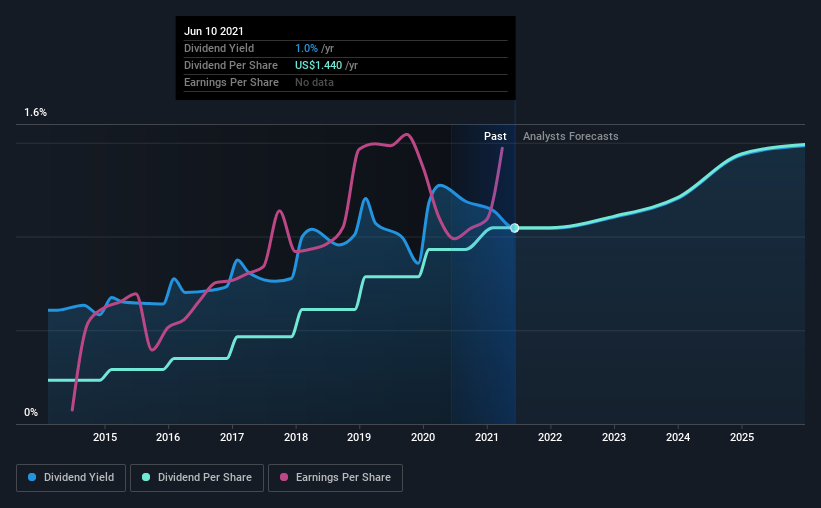Allegion (NYSE:ALLE) Could Be A Buy For Its Upcoming Dividend
Allegion plc (NYSE:ALLE) is about to trade ex-dividend in the next four days. The ex-dividend date is one business day before a company's record date, which is the date on which the company determines which shareholders are entitled to receive a dividend. The ex-dividend date is of consequence because whenever a stock is bought or sold, the trade takes at least two business day to settle. Thus, you can purchase Allegion's shares before the 15th of June in order to receive the dividend, which the company will pay on the 30th of June.
The company's next dividend payment will be US$0.36 per share, on the back of last year when the company paid a total of US$1.44 to shareholders. Calculating the last year's worth of payments shows that Allegion has a trailing yield of 1.0% on the current share price of $138.09. Dividends are an important source of income to many shareholders, but the health of the business is crucial to maintaining those dividends. We need to see whether the dividend is covered by earnings and if it's growing.
View our latest analysis for Allegion
Dividends are usually paid out of company profits, so if a company pays out more than it earned then its dividend is usually at greater risk of being cut. That's why it's good to see Allegion paying out a modest 29% of its earnings. Yet cash flow is typically more important than profit for assessing dividend sustainability, so we should always check if the company generated enough cash to afford its dividend. What's good is that dividends were well covered by free cash flow, with the company paying out 23% of its cash flow last year.
It's positive to see that Allegion's dividend is covered by both profits and cash flow, since this is generally a sign that the dividend is sustainable, and a lower payout ratio usually suggests a greater margin of safety before the dividend gets cut.
Click here to see the company's payout ratio, plus analyst estimates of its future dividends.
Have Earnings And Dividends Been Growing?
Businesses with strong growth prospects usually make the best dividend payers, because it's easier to grow dividends when earnings per share are improving. If earnings decline and the company is forced to cut its dividend, investors could watch the value of their investment go up in smoke. That's why it's comforting to see Allegion's earnings have been skyrocketing, up 23% per annum for the past five years. Allegion is paying out less than half its earnings and cash flow, while simultaneously growing earnings per share at a rapid clip. This is a very favourable combination that can often lead to the dividend multiplying over the long term, if earnings grow and the company pays out a higher percentage of its earnings.
Another key way to measure a company's dividend prospects is by measuring its historical rate of dividend growth. Allegion has delivered an average of 24% per year annual increase in its dividend, based on the past seven years of dividend payments. It's exciting to see that both earnings and dividends per share have grown rapidly over the past few years.
Final Takeaway
Has Allegion got what it takes to maintain its dividend payments? We love that Allegion is growing earnings per share while simultaneously paying out a low percentage of both its earnings and cash flow. These characteristics suggest the company is reinvesting in growing its business, while the conservative payout ratio also implies a reduced risk of the dividend being cut in the future. Overall we think this is an attractive combination and worthy of further research.
While it's tempting to invest in Allegion for the dividends alone, you should always be mindful of the risks involved. For example - Allegion has 2 warning signs we think you should be aware of.
We wouldn't recommend just buying the first dividend stock you see, though. Here's a list of interesting dividend stocks with a greater than 2% yield and an upcoming dividend.
This article by Simply Wall St is general in nature. It does not constitute a recommendation to buy or sell any stock, and does not take account of your objectives, or your financial situation. We aim to bring you long-term focused analysis driven by fundamental data. Note that our analysis may not factor in the latest price-sensitive company announcements or qualitative material. Simply Wall St has no position in any stocks mentioned.
Have feedback on this article? Concerned about the content? Get in touch with us directly. Alternatively, email editorial-team (at) simplywallst.com.

